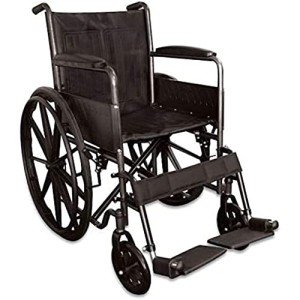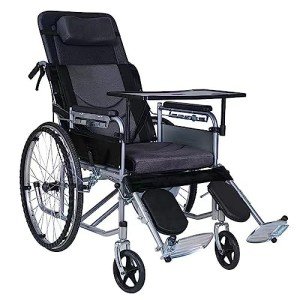Five Killer Quora Answers To Heavy Duty Bariatric Wheelchair
Freeman Leclair
0
8
02.09 10:06
 Heavy Duty Bariatric Wheelchair
Heavy Duty Bariatric WheelchairA strong bariatric self propelled wheelchair wheelchair is designed for individuals who need more capacity than a basic wheelchair. They are perfect for obese or obese individuals with restricted mobility due to weight problems or muscular dystrophy.
Selecting the right wheelchair is critical to your health and independence. The key distinction in between a bariatric wheelchair and a standard chair is their weight capacity.
Frame
As the name recommends, a sturdy bariatric wheelchair is developed to accommodate bigger individuals with higher weight capacities and wider seat widths. These specialized chairs are commonly utilized in healthcare facilities, property care facilities and other health care settings to improve quality of life for individuals with obesity or health conditions that cause excess weight gain.
Similar to all mobility, functional and healthcare equipment it is constantly advisable to consult from a health care professional or mobility professional when selecting and sourcing a wheelchair. They can evaluate, examine and recommend a chair finest matched to the person's requirements and environment.
It is also essential to fully think about the users home and work environment when sourcing a wheelchair as they will require to be able to browse entrances or passages that are most likely to have a much bigger turning radius than basic manual chairs. In addition to this factor to consider should be offered to the floor surface where a wheelchair will be used as if there is deep carpet it may provide increased resistance making it harder for either self or attendant propulsion.
As soon as these initial factors to consider have been made the next action is to carefully weigh the user (and where appropriate the caregiver/attendant) to ensure that the chosen wheelchair has a safe weight capacity for both the user and their medical conditions. It is likewise essential to guarantee that the selected chair has an ideal seat depth to accommodate the users body shape and size.
Lastly, to guarantee the maximum convenience for the user it is recommended to pick a wheelchair that uses pressure relief through a cushion. This is especially crucial for those who have a high threat of skin breakdown or pressure sores.
In the case of a heavy duty bariatric wheelchair a good choice would be a cushioned seat with a launderable nylon cover. This not just provides a comfortable fit but likewise eases pain triggered by sitting for long durations of time. In addition to this it is important to ensure that the chair is correctly fitted to avoid large spaces which can trigger pain, abrasion and heavy duty bariatric wheelchair reduce general seating stability.
Seating
The seating area of a bariatric wheelchair is developed to support a person's weight and size while supplying comfort, security, and ease of use. A range of various choices are offered, consisting of adjustable backrests and swing-away footrests. These accessories assist to enhance stability for the user and can decrease pressure ulcers, which are typical in long-term wheelchair users.
Unlike standard wheelchairs, strong bariatric chairs are normally made with reinforced frames and other components that can withstand a higher quantity of weight. In addition, they normally have larger seats to accommodate a bigger frame. These specialized functions make them more resilient and easier to keep, which assists ensure they continue to supply the required support and stability for people with larger builds.
Before picking a wheelchair, people need to take the time to precisely measure their body to figure out the right seat measurements. A good place to begin is by determining the range from one hip to the other and subtracting one inch. It's also helpful to consider the height of the armrests, as this can impact how easy it is to transfer in and out of the chair.
When selecting a wheelchair, people should make sure to choose a design that fulfills the requirements set by their doctor. For example, some doctor may just cover basic wheelchairs, whereas others will require patients to select a bariatric wheelchair based on their specific requirements and body size.
If you have Medicare, a bariatric wheelchair might be covered by the program as long as it is medically necessary. Nevertheless, many Medicare receivers do not understand that a bariatric wheelchair is readily available and might be paying out-of-pocket for a piece of equipment they do not need.
For those trying to find a premium bariatric wheelchair that is both functional and stylish, the Titus Heavy-Duty Wheelchair is a terrific choice. It is a long lasting and appealing wheelchair that offers a comfortable seat for bariatric wheelchair weight limit patients with an adjustable backrest, swing-away foot rests, and a sturdy slide tube frame. For a more personalized touch, it can be personalized with a wide variety of accessories such as trays and cushions.
Footrests
Unlike basic wheelchairs that utilize lightweight products, bariatric chairs have heavy-duty frames and larger wheels created for people who weigh more. In addition, these chairs come with a wider seating option, which is ideal for individuals who have problem moving their legs or are dealing with conditions like muscular dystrophy that cause weight gain.
Depending upon your special needs, you can select from 3 different seat widths and optional devices such as swingaway footrests or elevating leg rests. Other options consist of desk-length or full-length detachable arms and a long-lasting embossed back upholstery with double inner lining for toughness.
If you're looking for a bariatric transport chair, consider this model from Drive Medical. It features dual, reinforced steel cross braces that are able to support up to 450 pounds and a roomy 20" width seat. It also comes with a hassle-free back bring pouch that enables you to easily and safely transport individual items. In addition, this chair has a tough silver vein frame and resilient nylon upholstery. The swingaway footrests and raising leg rests are easy to operate, offering added patient comfort and security.
Accessories
Numerous wheelchairs are equipped with a series of accessories that can be included based upon specific user requirements. These include trays, seat cushions, and other security and convenience features. Wheelchair devices can also improve comfort and assistance by assisting avoid pressure ulcers. For example, the AliMed Bariatric Tri-Foam Cushion is developed to supply advanced pressure relief and decrease skin breakdown by dispersing weight uniformly.
Depending upon the person's distinct requirements, choosing the right chair might require assistance from a healthcare professional or mobility expert. They can examine the requirements of the person using the wheelchair, including their daily activities and physical restrictions. They can then recommend a chair that satisfies those requirements.
bariatric wheel chair wheelchairs are specialized wheelchairs that can hold greater body weight capacities than basic chairs. They can accommodate individuals with a large range of medical conditions that result in weight gain such as muscular dystrophy and obesity. They are generally designed with a heavier-duty frame, a broader seating area, and bigger wheels for stability and maneuverability.
The KM8520X20 strong bariatric wheelchair 600 lb capacity wheelchair from Karman features top quality and durable construction. Its heavy-duty, slide tube silver vein steel frame provides a robust base for bariatric users as much as 450 pounds. It has padded, height-adjustable flip-back armrests and swing away or elevating footrests for easy transfers and a comfortable seated position. The 24" rear urethane wheels are installed on resilient hand rims and function tool-free adjustable axles to enable the user to adjust their positioning.
Both bariatric wheelchair weight and basic wheelchairs are offered to assist individuals with restricted mobility navigate, however each has its own set of advantages. It's crucial to consider the specifics of each to discover the right option for you.
When considering a wheelchair, it is necessary to accurately measure yourself for size and fit. This consists of determining the seat-to-shoulder, hip-to-heel and armrest-to-armrest ranges while seated. This will guarantee that the chair is correctly sized to fit you and provides ideal convenience.
 For many people, a bariatric wheelchair will be covered by medical insurance under Medicare Part B or by personal health care service providers. Nevertheless, it's crucial to talk to your service provider before acquiring one to make certain that you are covered.
For many people, a bariatric wheelchair will be covered by medical insurance under Medicare Part B or by personal health care service providers. Nevertheless, it's crucial to talk to your service provider before acquiring one to make certain that you are covered. 




